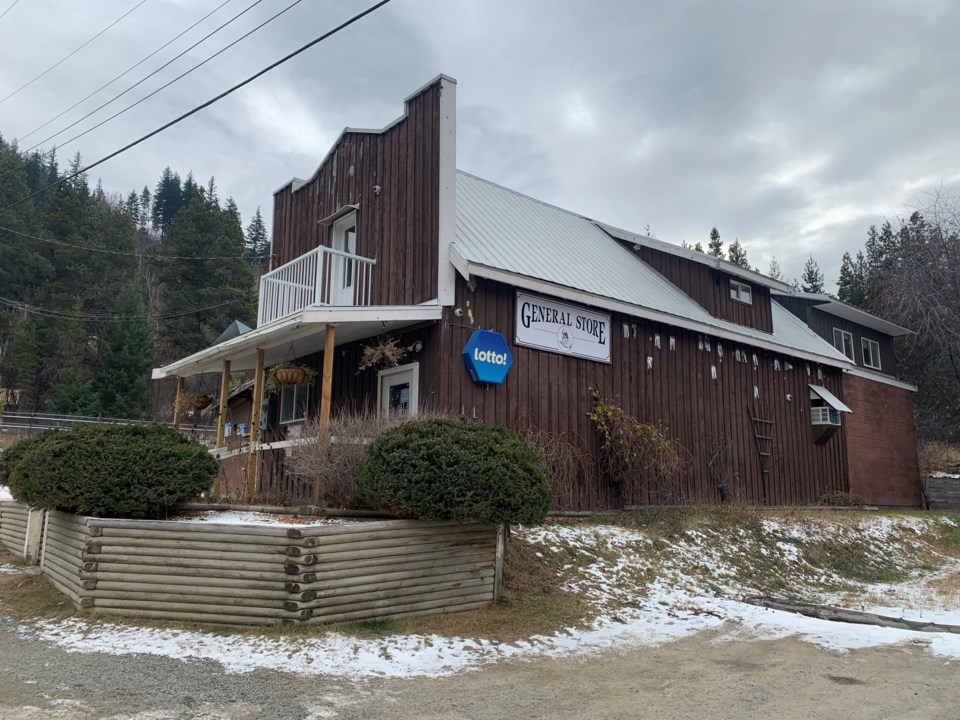About 85 kilometres up the Pemberton Meadows Road and over the Hurley lies the small community of Gold Bridge. It sits at the confluence of the Gun Lakes, Marshall Lake and Bralorne. Together, they have a population of 250 permanent residents.
And while some of those 250 residents might procure their own food, there’s only really one reliable option within driving range: the Valley General Store.
All that goes to say, it’s a departure for Lindsay Coleman. She moved to Gold Bridge from Vancouver’s Kitsilano neighbourhood during COVID. But after taking over the store in 2022, she’s brought some of that Kits spirit to the area by prioritizing fresh produce.
“We have an older generation up here who maybe didn't eat particularly healthy, and now they have a lot of options, and people are definitely shifting into a lot more healthy food over processed food based on just what was available without having to drive two hours.”
When she and her fiancé, Mark, met in 2019, she was a corporate event planner. He was finishing up school with plans of moving up to Gun Lake. When COVID-19 hit, her industry shuttered, and they moved up to Gold Bridge. She’d spent a few summers at Gun Lake with friends in the past, but thought it was “fairly insane to think about living [there.]”
“I think, had it not been for the pandemic, I don't know that I ever would have done it … it’s such a big jump. But, me and Mark bought a couple hundred dollars’ worth of vegetable seeds and just moved out to the bushes to get away from everything.
“At the time, it was easy and wonderful.”
Then, the store went up for sale. Coleman said Valley General had been managed by the same woman for some 40 years. The owner, now in her seventies, had been looking for a permanent replacement for some time. After some false starts with previous potential successors, the owner passed the store to Coleman.
“It was a big move for us to buy the store because I don't know if anyone else could have,” she remembered. “But there’s nothing else in the area, so, yeah, the community really needed it.”
Coleman saw it as an opportunity to bring some fresh produce into the Bridge River Valley.
“For many reasons, like the logistics and the costs and everything, [the previous owner] had just kind of given up on fresh food. It wasn't a thing here, and it's really important to me. I'm from Kitsilano, and it’s just part of everyone’s values there,” she told Pique.
“When I took over the store, [the owner] was maybe bringing in a quarter case of veggies—about 10 pounds—a week, and I remember ordering my first case of vegetables and being terrified that nobody would buy it. But now we're doing like 15 to 30 cases of veggies a week. So just a huge shift.”
Food sales have grown to a third of the store’s sales, rivalling beer sales. The last third consists of hardware, houseware, pet food, and “a lot of sled gear and dirt bike gear.”
She emphasized that fresh produce isn’t just part of her Kits identity, but part of her upbringing in a small town in Ontario.
“I'm from a very ingredient-focused household,” she said. “We make everything from scratch. So for me, getting away from processed foods and just giving better food to the community is still so important.”
She’s expanded the fresh offerings to ready-to-go meals; after earning a permit in January, the store started operating a deli with fresh sandwiches and salads ready to grab and go.
Save on sourcing local
When he isn’t busy with his own company or working as a small engine mechanic, Coleman’s fiancé takes up the delivery driver role. He drives out to Lillooet, Pemberton or beyond once a week during most of the year—though the busier summer season, which sees tourists flock to the Valley, can see those trips jump up to two to three times a week.
“It’s been a learning curve to say the least,” said Coleman. “We've taken over getting our groceries just because it was so cost-prohibitive to use our previous courier. We go pick up our dog food in Surrey, for example, because it's like a thousand dollars to have it delivered. And at that point, we can't afford to sell dog food anymore.”
Coleman said that, despite to their remote nature, the cost of sourcing local isn’t as daunting as it might seem. She said she pays more for supplies from her wholesale grocer than she pays for the same product at Independent Whistler.
“There seems to be an idea that going out and getting the local and the farmer stuff is more expensive, but in my situation, it absolutely is not. It's a little bit more work, for sure, but definitely worth our while to support local BC farmers and bring in as much product from around our area as we can.”




